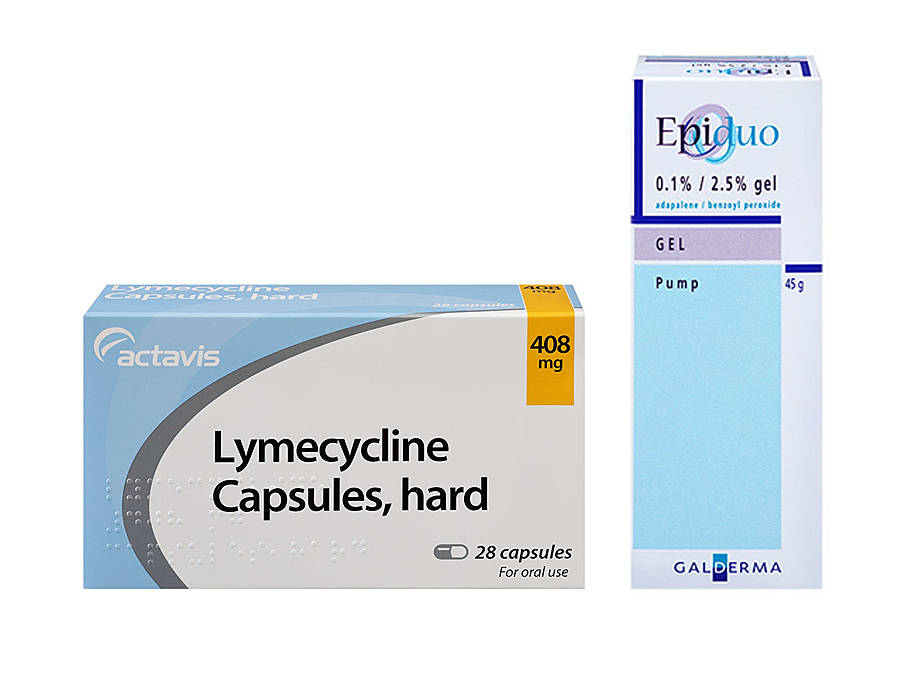Lymecycline and Epiduo
Order consultation for Lymecycline capsules and Epiduo gel


Lymecycline is an antibiotic used to treat acne, a very common skin condition. It is taken orally over the course of several weeks.
To place a prescription order for acne treatment, fill in our brief questionnaire. You can choose a preferred treatment, such as Lymecycline. You will need to upload a photograph so our doctor can diagnose your acne.
One of our doctors will check if the medication is suitable for you and issue your prescription to a local pharmacy in Ireland or your home address. Alternatively, you can choose to have your medication delivered directly to your door.
A consultation for a prescription for acne treatment costs €21.50.



About Lymecycline and Epiduo
What is Lymecycline?
Lymecycline is a prescription-only antibiotic suitable for treating moderate and severe cases of acne. It belongs to a group of antibiotics known as tetracycline antibiotics. Lymecycline specifically targets bacteria which cause the inflammation typical for acne.
By killing these bacteria called Propionibacterium acnes, Lymecycline allows acne to heal and prevents new inflamed acne from forming.
What is Tetralysal 300?
Tetralysal is a branded medication made by the manufacturer Galderma. Tetralysal contains the active ingredient Lymecycline and therefore works exactly in the same way. Whether you are taking Lymecycline or Tetralysal, the same instructions apply, and both are equally effective in treating acne.
How does Lymecycline with Epiduo work?
Lymecycline effectively prevents bacteria from spreading. It destroys the bacteria's ability to produce proteins essential to their survival. As a result, the bacteria are unable to reproduce and grow, giving your immune system a chance to fight them off. Although some bacteria have developed a resistance to Lymecycline, it is still an effective antibiotic for acne. It is also used to treat a range of other conditions. It is available under various brand names, including Tetralysal.
Epiduo gel has 2 active ingredients that help to improve acne. The benzoyl peroxide helps kill the bacteria causing the acne, and the adapalene works in a similar way to vitamin A, to keep your skin healthy.
Why would I treat acne with Lymecycline?
Usually, Lymecycline is given to patients with severe acne or when other treatments have proven unsuccessful. Some people develop side effects while taking antibiotics. If you experience severe side effects, then the disadvantages may outweigh the advantages in your case. However, patients generally respond well to taking Lymecycline.
Lymecycline should always be used in combination with treatments that you put on your skin – like Epiduo. There are a variety of creams, gels, and lotions that are recommended. These work differently to Lymecycline and mean that your treatment is more effective.
Does Lymecycline or Epiduo interact with alcohol or certain foods?
Although the effectiveness of Lymecycline can be affected by milk and milk products, this is only the case if you consume large quantities. You should allow some time between taking your tablet and consuming large amounts of milk, cheese or yoghurt.
Epiduo doesn't interact with any food.
Alcohol can dry out your skin, so it's best to limit the amount of alcohol you drink to make sure your treatment works well.
Can I take Lymecycline and Epiduo during pregnancy?
No. Lymecycline should not be taken by pregnant or breastfeeding women. Exposure to Lymecycline can affect your baby's development, especially their teeth. You should also stop taking it if you're planning to become pregnant. Lymecycline is not suitable for children under the age of 12 or patients who have previously developed an allergic reaction to an antibiotic of the tetracycline group.
It's not clear if Epiduo is safe for pregnant women.
Is there anything else I need to know?
During your course of Lymecycline, you may experience an increased sensitivity to sunlight, which is a side effect of the medication. You can continue taking the antibiotic, but you must avoid direct sunlight as well as certain artificial light sources, for example in tanning salons.
How long do I need to take the antibiotic for?
If Lymecycline is taken as an acne medication, it is necessary to follow a course of at least 8 weeks. Acne tends to respond slowly to oral antibiotics but usually shows good results within this time frame.
Once you've started treatment, you should continue taking your tablets for as long as your doctor has instructed. The antibiotic will not work if it's not taken consistently, and bacteria can develop resistance if you discontinue the course prematurely.
If you experience severe side effects, however, you may need to stop the treatment immediately.
Please consult a doctor if you experience visual disturbances or experience an allergic reaction.
I have forgotten one dose. Is that a problem?
As Lymecycline is an antibiotic, you are strongly advised to take it regularly, as instructed. If you forget to take a tablet, take it as soon as you remember, then continue with the next tablet at the normal time. If the next tablet is due by the time you remember, just take one.
Rare Lymecycline and Epiduo side effects
Rare lymecycline side effects include:
- allergic reactions
- facial swelling involving the tongue and throat
- difficulty breathing
- peeling and swelling of the skin
- rashes
- visual disturbances
- jaundice and vomiting
- dizziness
- increased sensitivity to sunlight
- increased pressure in the brain
- fever
- discolouration of teeth and enamel
- yeast infection (affecting the anus or genitals)
Rare Epiduo side effects include:
- feeling faint
- tight or swollen throat
- water retention around the eyes and a puffy face
- a rash or hives (rash with raised bumps)
- allergic reaction
- itching
- inflamed skin where the gel is used
- breathing problems
- changes to skin colour
- your skin is sensitive to the sun
Which drugs do Lymecycline and Epiduo interact with? If
If you take Lymecycline, you must not take any of the following medications at the same time:
- Nutritional supplements containing calcium, aluminium, magnesium, iron or zinc
- Indigestion medication
- Ulcer healing medication
- Quinapril
You may be able to take Lymecycline if you allow two hours before and after taking these types of medication but speak to your doctor for advice on this.
You must also let your doctor know if you're taking:
- any other oral acne medication
- anticoagulants
- diuretics
- medicines for epilepsy (e.g. barbiturates)
- methoxyflurane (an anaesthetic)
Epiduo can also interact with some medications. Always tell your doctor about your current medications when ordering acne treatment.
How to take Lymecycline with Epiduo
You'll need to take one 408mg lymecycline tablet once a day, ideally in the morning. Swallow your tablet with plenty of water and avoid consuming large amounts of milk or milk products shortly before and after taking Lymecycline.
Apply a thin layer of Epiduo gel to your acne symptoms once a day.
Ingredients
Each lymecycline tablet contains 408mg of the active ingredient of the same name. Additional ingredients include magnesium stearate, colloidal silica, gelatin, titanium dioxide, erythrosine, quinoline yellow and indigo carmine. Lymecycline tablets are usually hard gelatin capsules with a blue cap and a white body.
Epiduo contains adapalene and benzoyl peroxide, and also disodium edetate, docusate sodium, glycerol, poloxamer, propylene glycol (E1520), simulgel 600PHA, and purified water.
Please ensure you keep your medication out of reach of children and store it at temperatures below 25 °C.
Common side effects
Common side effects of Lymecycline are:
- Feeling nauseous and being sick
- Diarrhoea
- Abdominal pain
- Headache
Common side effects of Epiduo are:
- Dry skin
- Getting a skin rash on the areas that you apply Epiduo
- Redness, irritation, or burning sensation where you've used Epiduo
- Scaly skin

Dr Kathryn Basford is an IMC and GMC registered GP who works with our Irish team here at ZAVA. She graduated from the University of Manchester and completed her GP training at Whipps Cross Hospital in London.
Meet our doctorsLast reviewed: 22 Dec 2020
